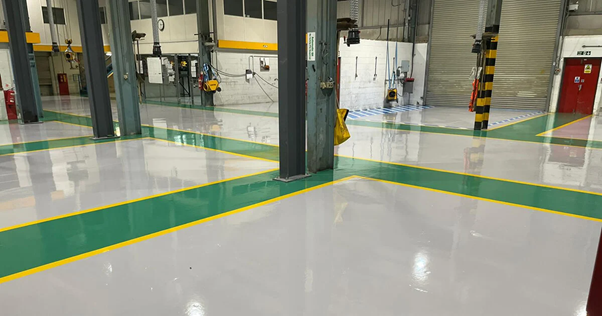Industrial floor paint is essential to sustaining the appearance and operation of commercial spaces. Protect from temperature and humidity, resistant to chemicals, foot traffic, abrasions, and hefty equipment, in addition to being aesthetically pleasing. There are epoxy coating for vehicle traffic areas, and for durability against chemicals, there are polyurethane coatings; these are among the few examples of the many kinds of commercial floor paints available.
Businesses may choose the most successful for them if they understand their possibilities. Factors like sliding resistance and efficiency could impact your choice-making process, so it’s crucial to consider your options. To assist you in choosing the most suitable choice for the workplace, we’ll look at the several types of industrial floor paint in this piece and their traits, applications, and other important information.
Industrial floor paints: why are they important?
Commercial and industrial spaces cannot function or remain safe and require industrial flooring materials. Their are a range of best Industrial floor coating types.
These coating systems offer an effective defense to prevent floors from being damaged by numerous outside influences and are easier to maintain, including heavy machinery and foot traffic. The rapid disintegration of floors without this protection puts people at risk and increases repair expenses.
Industrial flooring products are immune to damage by protecting the subfloor from substances, commonly oils and other fluids typical of working environments. The floor’s durability and the surrounding area’s cleanliness are protected by its chemical resistance.
Industrial floor coatings can increase visibility and safety by adding characteristics like slip resistance, which helps workers and visitors navigate the area safely. These paints can improve aesthetics, withstand wear and tear and create a flawless, professional look that benefits the company.
Commercial floor coatings are environmentally friendly and critical for preserving flooring, assuring security, preserving hygienic conditions, and improving industrial settings’ overall usefulness and attractiveness.
Types of floor paints
Some of the best industrial floor coatings are available, including concrete floor paint for different surfaces. It mainly includes a range of epoxy floors. You can choose according to your needs.
Epoxy floor Paints
The versatility and longevity of epoxy floor coatings have made them a popular industrial coating alternative. When applied to concrete floors, these paints, consisting of epoxy resins and hardeners, create a durable, smooth surface. The exceptional resistance to abrasions, impacts, and solvents makes epoxy coatings for floors ideal for use in warehouses, production facilities, and other commercial locations with heavy foot traffic.
The protective layer that they form on concrete surfaces prevents floors from getting harmed by heavy machinery, foot traffic, and spills. Diverse equations of epoxy paints are available, allowing for flexibility in accommodating diverse application needs.
These formulations can be potentially solvent-based or water-based. You can make them even more distinctive by adding decorative flakes or impermeable aggregates to make them safer, resistant to damage and more appealing to the eye.
Epoxy floor coatings are perfect for places that demand a sanitary and visually pleasing surface since, once applied, they cure to a durable finish that is easy to clean and maintain. The epoxy may withstand extreme temperatures and act as a sealer for different floors. If you want your industrial floors to last longer, be safer, and look better, then you should look into epoxy floor paints.
Polyurethane floor paints
Another standard factory option is polyurethane floor coatings, renowned for their long-lasting endurance and chemical resistance. It is very easy to apply. When applied to concrete floors, these paints, comprised of polyurethane resins, form a solid protective layer. Labs, food processing factories, and automobile maintenance shops are just a few examples of places where you might come across them used.
These places are known for regular chemical exposure, spills, and stains. Polyurethane floor coverings are highly durable because they are impermeable to various substances, including acids, solvents, oils, and more. Because of their abrasion resistance, they are also appropriate for areas frequently interacting with heavy machines or gadgets.
Like epoxy paints, polyurethane floor paints are offered in various formulae to suit multiple uses. You may customize them by applying them in clear or colored versions. After curing, polyurethane floor coatings provide a smooth, easy-to-clean surface that looks great and works great, especially in high-traffic industrial settings; when protecting and enhancing the longevity of industrial floors, polyurethane floor coatings are well-regarded for their resilience, chemical resistance, and overall effectiveness.
Anti-Slip Floor Paint
An anti-slip floor paint specialist coating reduces slips and falls in commercial and industrial environments. When applied to floors, the mixture’s additives, such as aggregates or textured materials, create a rough surface. This uneven surface improves traction, giving cars and pedestrians more incredible grip, especially where spills or moisture are likely to occur.
To improve safety, anti-slip floor paint is frequently used in heavy traffic areas, including loading docks, walkways, garage floors and manufacturing facilities. Its application is simple; generally, it entails properly washing the surface, uniformly applying the paint, and letting it dry.
The paint comes in various formulas, including epoxy and polyurethane, to accommodate multiple floor types and application requirements. Anti-slip floor paint lowers the risk of accidents without sacrificing the floor’s functioning or appearance once it is applied. It offers long-lasting protection. It’s a helpful way to keep a safe workplace in sectors where worker safety is critical.
Epoxy Flake floors
The sturdy and visually pleasing epoxy flake floor system is developed by mixing epoxy resin with decorative epoxy flakes. The attractive layout and enduring performance of these flooring render them popular in residential, commercial, and industrial spaces. To install the floor, prepare the surface by passing on a thin layer of epoxy resin.
Then, sprinkle epoxy flakes over the moist epoxy. After the base coat dries, you can remove any extra flakes and seal them with a clear epoxy topcoat. This will also add protection. Durability, chemical resistance, and ease of maintenance are just a few benefits of epoxy flake flooring.
Garages, warehouses, and retail spaces benefit significantly from the rough surface of epoxy flakes, as they promote traction and hide defects. You can personalize epoxy flake floors to complement any design aesthetic because they come in extensive colors and patterns. In sum, epoxy flake floors are a stunning and practical flooring solution that works well in various settings.
Anti-Static epoxy paint
A specialist coating called anti-static epoxy paint is intended to reduce the accumulation and release of static electricity on floors. Its conductive materials disperse electrical charges, lowering the possibility of potential safety risks or sensitive electronic equipment being damaged by static electricity.
These paints are frequently employed in clean rooms, laboratories, and electronics production facilities where electrostatic discharge (ESD) can be dangerous. Like traditional epoxy paints, anti-static epoxy paint application comprises surface preparation, paint usage, and curing.
Ensuring the application is grounded correctly is imperative to maximize its anti-static qualities. Anti-static epoxy paint offers a flawless, long-term finish that protects the floor and helps preserve a static-free atmosphere. This capability is crucial for businesses where static electricity could interfere with delicate processes or supplies.
Anti-static epoxy paint can also be customized to meet unique functional and aesthetic needs because it comes in various colors and formulas. It’s a valuable method for guaranteeing security and maintaining the integrity of electronic parts in static-sensitive settings.
Things to consider while buying industrial floor paints
Resistance and Durability
Resistance and durability are the most important factors when buying floor paint for industrial use. Find paints that won’t chip or peel under constant chemical exposure, foot traffic, and heavy machinery. Paints made of epoxy or polyurethane are well-suited for use in industrial settings due to their long lifespan and excellent resistance to wear and tear, drops, and chemical spills.
The process and compatibility of the application
Think about how you will apply the paint and whether or not it will be compatible with your current floor. Primers and other preparatory techniques may be necessary to properly adhere and perform certain paints. Ensure the paint you pick won’t peel or delaminate by checking if it’s compatible with your facility’s substrate and application process.
Prevention of Slips and Falling
When choosing industrial floor coatings, safety must be your first concern. Choose paints with slip-resistant characteristics, particularly for wet or spill-prone areas. Enhancing traction and reducing the danger of slips and falls can be achieved using anti-slip additives or textured treatments, creating a safer work environment for employees and tourists.
Resistance to Chemicals
Before using the paint in an industrial setting, ensure it can resist chemicals like acids, solvents, and oils by testing its chemical resistance. Polyurethane floor coatings are an excellent choice for facilities concerned about chemical spills due to their exceptional chemical resistance.
Lack of Problems with Upkeep
When selecting industrial floor coatings, consider how easy they are to maintain. To reduce maintenance time and personnel expenses, use simple paints to clean and keep in good condition. Epoxy and polyurethane paints produce smooth, seamless surfaces and are ideal for keeping surfaces clean and germ-free.
Taking Aesthetics into Account
Think about how it will look as well as how it will perform. Pick up floor paints for your industrial space that will do double duty as protection and aesthetics. You can get floor paint in a wide range of colors and finishes to make it look exactly how you want it to.
Efficacy and Durability
Lastly, think about how long the paint will last and how much it will cost. Spending more money on high-quality paints initially might save money in the long run by lowering the frequency of repairs and repainting. Find the best option for your facility by comparing the original cost with the paint’s lifetime.
FAQ’s
What are the different types of industrial floor paint?
Industrial floor coatings come in various varieties, including concrete, epoxy, polyurethane, and acrylic. There are a wide variety of industrial settings that can make use of each type’s unique qualities.
How do I pick my facility’s industrial floor paint?
When selecting industrial floor paint, consider longevity, chemical resistance, slip resistance, maintenance convenience, and personal style. Finding the best paint will require evaluating your facility’s needs and requirements.
Are food processing plants safe places to use industrial floor paints?
In food processing facilities, several industrial floor coatings are suitable for use. Plants that abide by FDA rules and are made especially for use in food-grade settings must be selected to guarantee safety and industry compliance.
Are concrete floors already in place able to be painted industrially?
Indeed, industrial floor coatings can be used on existing concrete floors after the appropriate surface preparation. The concrete surface must be cleaned, etched, and primed to guarantee good adhesion and long-lasting paint performance.
For how long does industrial floor paint take to dry and cure?
The kind of paint, the surroundings, and how it is applied all affect how long industrial floor paint takes to dry and cure. Generally, industrial floor coatings take several days to fully cure and 24 to 72 hours to dry before heavy use.
Conclusion
Keeping safe, long-lasting, and attractive floors in industrial and commercial settings requires knowledge of the various kinds of industrial floor paint. Whatever your requirements high traffic longevity, chemical resistance, or slip resistance, there is an industrial floor paint variety to fit them. When purchasing the ideal industrial floor paint for your business, you can decide by considering durability, safety, maintenance needs, and cost. Industrial coating for floors improves both the appearance and functionality of your floors and helps create a safer and more productive workspace when utilized and maintained efficiently.

